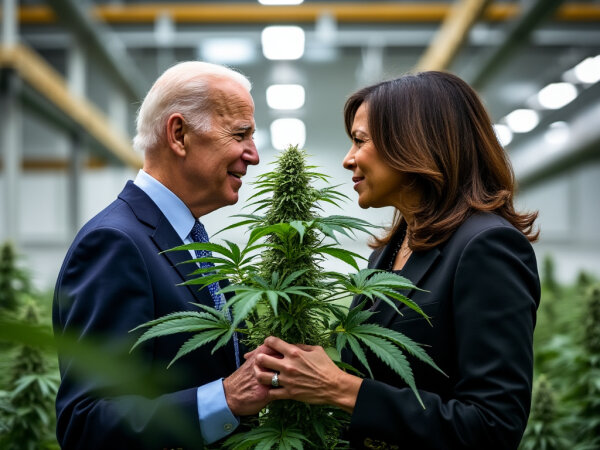Marijuana Reclassification Decision Delayed, Setting Stage for Key 2024 Election Issue

09/13/2024
A decision on whether to reclassify marijuana as a less dangerous drug has been postponed until after the November presidential election, with the U.S. Drug Enforcement Administration (DEA) setting a hearing for December 2. This timeline suggests that marijuana’s federal status could become a pivotal issue in the 2024 race for the presidency.
The proposed reclassification would move marijuana from Schedule I, where it is currently listed alongside heroin and LSD, to Schedule III, a category recognizing its medical uses and lower potential for abuse. This historic shift follows a recommendation from the Department of Health and Human Services, prompted by President Joe Biden, who called it “monumental.”
Vice President Kamala Harris has voiced support for decriminalizing marijuana, a notable shift from her earlier stance when she oversaw cannabis enforcement in California. Former President Donald Trump has signaled increasing support for marijuana reform, recently endorsing a Florida legalization measure and stating that people shouldn’t be jailed for cannabis. However, his campaign has not clarified his position on rescheduling the drug.
While rescheduling would not legalize recreational marijuana, it could offer significant benefits to the growing cannabis industry. Businesses could take tax deductions currently denied to companies dealing in Schedule I and II substances, potentially lowering their tax burden from 75% to 25%. Additionally, reclassification could make it easier for cannabis companies to access banking services and facilitate research on the drug.
Public opinion has shifted in favor of marijuana legalization, with a 2023 Gallup poll showing 70% of Americans support it. However, opposition remains, with groups like Smart Approaches to Marijuana arguing that more research is needed before rescheduling.
As the federal government continues to lag behind state policies—38 states have legalized medical marijuana—this decision could significantly impact the 2024 election, with candidates’ positions influencing a broad base of voters.
Reference
The proposed reclassification would move marijuana from Schedule I, where it is currently listed alongside heroin and LSD, to Schedule III, a category recognizing its medical uses and lower potential for abuse. This historic shift follows a recommendation from the Department of Health and Human Services, prompted by President Joe Biden, who called it “monumental.”
Vice President Kamala Harris has voiced support for decriminalizing marijuana, a notable shift from her earlier stance when she oversaw cannabis enforcement in California. Former President Donald Trump has signaled increasing support for marijuana reform, recently endorsing a Florida legalization measure and stating that people shouldn’t be jailed for cannabis. However, his campaign has not clarified his position on rescheduling the drug.
While rescheduling would not legalize recreational marijuana, it could offer significant benefits to the growing cannabis industry. Businesses could take tax deductions currently denied to companies dealing in Schedule I and II substances, potentially lowering their tax burden from 75% to 25%. Additionally, reclassification could make it easier for cannabis companies to access banking services and facilitate research on the drug.
Public opinion has shifted in favor of marijuana legalization, with a 2023 Gallup poll showing 70% of Americans support it. However, opposition remains, with groups like Smart Approaches to Marijuana arguing that more research is needed before rescheduling.
As the federal government continues to lag behind state policies—38 states have legalized medical marijuana—this decision could significantly impact the 2024 election, with candidates’ positions influencing a broad base of voters.
Reference







